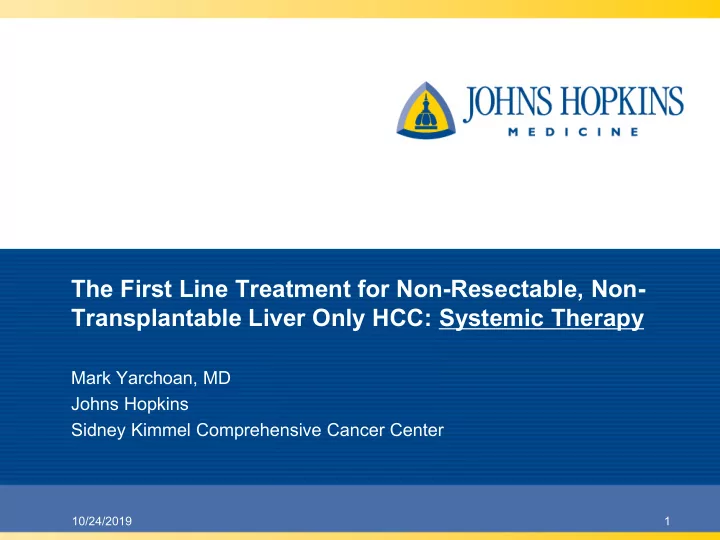

The First Line Treatment for Non-Resectable, Non- Transplantable Liver Only HCC: Systemic Therapy Mark Yarchoan, MD Johns Hopkins Sidney Kimmel Comprehensive Cancer Center 10/24/2019 1
Disclosures Grant/Research Support: • Bristol-Myers Squibb; Exelixis, Inc.; and Merck & Co., Inc. Scientific Advisory Board: • Eisai Inc. and Exelixis, Inc. 10/24/2019 2
Audience Response Question In patients with for non-resectable, liver-only HCC (BCLC B disease), a comparison of locoregional therapy with Y90 versus systemic therapy with sorafenib (SIRveNIB trial) demonstrated: A) Greater survival for Y90 than sorafenib B) Greater survival for sorafenib than Y90 C) Similar survival for sorafenib as Y90 10/24/2019 3
Non-Resectable, Non-Transplantable Liver Only HCC: Current Guidelines Villanueva A. Hepatocellular Carcinoma N Engl J Med 2019
Question: If TACE were a drug presented to the FDA today for BCLC B HCC, would it be approved? Answer: NO • Systemic therapy (sorafenib, etc.) IMPROVES SURVIVAL in patients with unresectable HCC – Similar or greater benefits for patients without extrahepatic spread • TACE has failed to improve survival in most studies of unresectable HCC – TACE reduced tumor growth but worsened liver function and DID NOT IMPROVE SURVIVAL in a randomized phase 3 study (N Engl J Med 1995;332:1256-61.) – Cochrane Meta-analysis: TACE or TAE versus control DOES NOT SIGNIFICANTLY INCREASE SURVIVAL • For trials with low risk of selection bias, hazard ratio 1.22, 95% confidence interval 0.82 to 1.83; P = 0.33 • "There is no firm evidence to support or refute TACE or TAE for patients with unresectable HCC" Llovet JM. N Engl J Med 2008; 359:378-390 Cochrane Database Syst Rev. 2011 Mar 16
SARAH Phase 3 Trial (2017): Sorafenib vs. Y90 • Randomized 467 patients to SIRT with Y90 or systemic therapy with sorafenib • Primary endpoint (overall survival) not statistically different but numerically greater with sorafenib – 8.0 months (SIRT) versus 9.9 months (sorafenib) (p=0.18) • If SIRT were a drug presented to the FDA for “noninferiority” to sorafenib in BCLC B HCC, would it be approved? • Answer: NO ( To claim non-inferiority, FDA requires that the upper boundary of the 95% CI is equal to or below 1.08; in this case HR is 1.15) Vilgrain V. Lancet Oncol. 2017;18(12):1624
SIRveNIB trial (2018): Sorafenib vs Y90 • Open-label phase 3 trial comparing yttrium-90 (Y90) with sorafenib in patients with unresectable HCC • Primary endpoint (overall survival) not statistically different but numerically greater with sorafenib – 8.8 months (Y90) versus 10.0 (sorafenib), (P = 0.36) • If Y90 were a drug presented to the FDA for “noninferiority” to sorafenib in BCLC B HCC, would it be approved? • Answer: NO ( To claim non-inferiority, FDA requires that the upper boundary of the 95% CI is equal to or below 1.08; in this case HR is 1.12) Chow PKH et al. J Clin Oncol. 2018
Reasons to consider systemic therapy first • Patients undergoing locoregional therapy may miss a window to receive effective systemic therapy – Historical studies conducted when sorafenib was the only systemic option – 7 systemic therapies now approved • Systemic control should come first before targeting individual lesions (oncologic first principles) • Cross trial comparisons support use of newer systemic agents over locoregional therapies Vilgrain V. Lancet Oncol. 2017;18(12):1624
History of Hodgkin Lymphoma Era of local therapies Era of systemic therapy You are 1930 1950 1962 1964 1975 2010s Current here Rene Gilbert Vera Peters Henry Kaplan Vincent DeVita Gianni New systemic Attempts to uses wide field uses develops the Jr. develops Bonadonna agents omit radiation to radiotherapy to medical linear MOPP develops (Brentuximab, radiotherapy treat Hodgkin treat adjacent accelerator to (mustard, ABVD nivolumab) completely lymphoma. lymph nodes in treat Hodgkin vincristine, (doxorubicin, 2017-2021 Hodgkin lymphoma procarbazine, bleomycin, Lenvatinib, Nivolumab, lymphoma prednisone) vinblastine, Pembrolizumab, Cabozantinib, dacarbazine) Regorafenib, Ramucirumab Lenvatinib/pembrolizumab Durvalumab/trememlimumab Bevacizumab/atezolizumab Ipilimumab/nivolumab Cabozantinib/atezolizumab …
Summary • Systemic therapy beats supportive care in unresectable HCC – Locoregional therapies does not beat supportive care in multiple randomized studies in BCLC B HCC • Locoregional therapy has failed to beat sorafenib in BCLC B HCC (in two separate studies), and does not meet FDA criteria for non-inferiority • Multiple newer agents tip the scale further towards early use of systemic therapy – Multiple lines of systemic therapy are now available and its important that patients do not miss a window to receive them – Newer systemic agents and combinations are likely to definitively beat sorafenib • Locoregional therapy remains an important tool when local liver response is urgently needed (portal vein invasion, for example) – Okay to return to locoregional therapy after systemic therapy if liver response is critical
Revised algorithm based on available evidence Modified from: Villanueva A. Hepatocellular Carcinoma N Engl J Med 2019
Thank you 10/24/2019 12
Recommend
More recommend